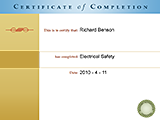Hearing: What? Protect Your Hearing
- Product ID
- clmiwpyh
- Training Time ?
- 34 to 68 minutes
- Language(s)
- English
- Video Format
- Standard Definition
- Required Plugins
- MasteryNet Player
- Lesson Interactions
- 13
- Quiz Questions
- 16
- Closed Captioning



Online Hearing Conservation Training
This hearing conservation training takes an entertaining approach to teaching workers about hearing protection. Your workers will see what happens when they don't take steps to protect their hearing. In hearing conservation training, your workers will discover how to protect their hearing by learning how sound affects the ear, how hearing loss occurs, and the warning signs of hearing loss. In hearing conservation training, they will also learn how to use the different types of hearing protection.
![]() This course is in the Advantage™ format, to read about Advantage™ features click here.
This course is in the Advantage™ format, to read about Advantage™ features click here.

- Install on any SCORM LMS
- Rich multimedia presentation with interactions and quiz
- Print certificate and wallet card
- You have 30 days to complete the course
Hearing conservation training is intended for all employees working in or around areas where hearing protection is required.
-
Understanding Sounds
- Hearing loss
- Defining sound
- Sound vs. noise
-
Causes of Hearing Damage
- Understanding sound
- Decibel levels
-
Using Hearing Protection
- Hearing without protection
- Types of hearing protection
- Using disposable earplugs
- Using reusable earplugs
- Using earmuffs
-
Attitudes About Hearing
- Hearing with hearing protection
- Recognizing the importance of hearing protection
-
Signs of Hearing Damage
- Warning signs
- Testing
-
Relate sound to the ability to hear.
- Recognize that hearing loss is permanent.
- Define sound.
- Agree that sound and noise is the same thing.
-
Be cautious of things that cause hearing damage.
- State the typical decibel level of a normal conversation.
- Recall the formula used to calculate potential hearing damage in the workplace.
- Identify work settings where hearing protection is needed.
-
Use proper hearing protection when needed.
- Select the distance at which a regular conversation should be heard without needing hearing protection.
- Identify various types of hearing protection.
- List the correct process used to apply disposable earplugs.
- Differentiate between disposable and reusable earplugs.
- List precautions to take when wearing earmuffs.
-
Protect your hearing from damage.
- Choose actions to take if hearing protection is uncomfortable.
- Agree that wearing hearing protection does not block out all sound.
-
Recognize signs of hearing damage.
- Evaluate warning signs of possible hearing damage.
- Explain how testing helps determine hearing loss.
© Mastery Technologies, Inc.




